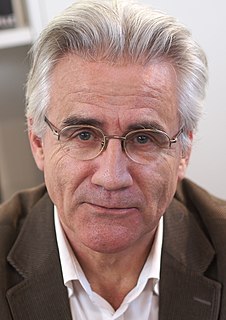A Quote by Martin Luther
Anyone who can be proved to be a seditious person is an outlaw before God and the emperor; and whoever is the first to put him to death does right and well. Therefore let everyone who can, smite, slay and stab, secretly or openly, remembering that nothing can be more poisonous, hurtful, or devilish than a rebel.
Related Quotes
If the peasants are in open rebellion, then they are outside the law of God. Therefore let all who are able slash, strike down, and kill (those who rebel) openly and secretly, remembering that there can be nothing more venomous, harmful, or devilish than a rebel. It is exactly like killing a mad dog.
In some instances, you may care so much about the person who has hurt you, or be so unable to be angry with him (or with anyone), that you rationalize his hurtful acts by finding some basis in your own actions for his hurtful behavior; you then feel guilty rather than angry. Put in other terms, you become angry with yourself rather than with the one who hurt you.
The first time I met Harrison, I think, was at the very first read through of the script. As anyone would be, I was a bit nervous before meeting him. I mean, it's Han Solo, so it was quite crazy. But once you get to know him, he really is such an amazing person. He's such an amazing actor as well. As I said before, his presence really does get the best out of you as an actor.
Anna Petrovna (to Shabelsky): You can't make a simple joke without an injection of venom. You are a poisonous man. Joking apart, Count, you're very poisonous. It's hideously boring to live with you. You're always grumpy, complaining, you find everyone bad, good for nothing. Tell me frankly, Count, did you ever speak well of anyone?
The wise man does nothing but what can be done openly and without falseness, nor does he do anything whereby he may involve himself in any wrong-doing, even where he may escape notice. For he is guilty in his own eyes before being so in the eyes of others; and the publicity of his crime does not bring him more shame than his own consciousness of it.
But that's always the way; it don't make no difference whether you do right or wrong, a person's conscience ain't got no sense, and just goes for him anyway. If I had a yaller dog that didn't know no more than a person's conscience does I would pison him. It takes up more room than all the rest of a person's insides, and yet ain't no good, nohow.
Strong emotional experiences are for the most part impersonal. Anyone who has hated another person so much that only chance stands between that person and death knows this, as does whoever has fallen into the catastrophe of a deep depression, anyone who has loved a woman to the dregs, anyone who has beaten others bloody or ever come up behind another person with muscles trembling. "Losing one's head," language calls it. Emotional experience is, in itself, poor in qualities; qualities are brought to it by the person who has the experience.
If, therefore, man has come into the world to search for God and, if he has found Him, to adhere to Him and to find repose in adhering to Him-man cannot search for Him and attain Him in this sensible and corporeal world, since God is spirit rather than body, and cannot be attained in intellectual abstraction, since one is able to conceive nothing similar to God, as he asserts-how can one, therefore, search for Him in order to find Him?
The simple person lives the way he breathes, with no more effort or glory, with no more affectation and without shame Simplicity is freedom, buoyancy, transparency. As simple as the air, as free as the air The simple person does not take himself too seriously or too tragicallyHe has nothing to prove, since he has no appearances to keep up, and nothing to seek, since everything is before him. What is more simple than simplicity? What is lighter? It is the virtue of wise men and the wisdom of saints.
What's given, in fact, always depends on the person or thing it's given to. A minor incident in the street brings the cook to the door and entertains him more than I would be entertained by contemplating the most original idea, by reading the greatest book, or by having the most gratifying of useless dreams. If life is basically monotony, he has escaped it more than I. And he escapes it more easily than I. The truth isn't with him or with me, because it isn't with anyone, but happiness does belong to him.
Whoever has God truly as a companion, is with him in all places, both on the streets, and among people, as well as in church, or in the desert or in a monastic cell...Why is this so? It is so because such a person possesses God alone, keeping their gaze fixed upon God, and thus all things become God for him or her. Such people be a God in all their deeds and in all the places they go, and it is God alone who is the author of all their deeds.







































